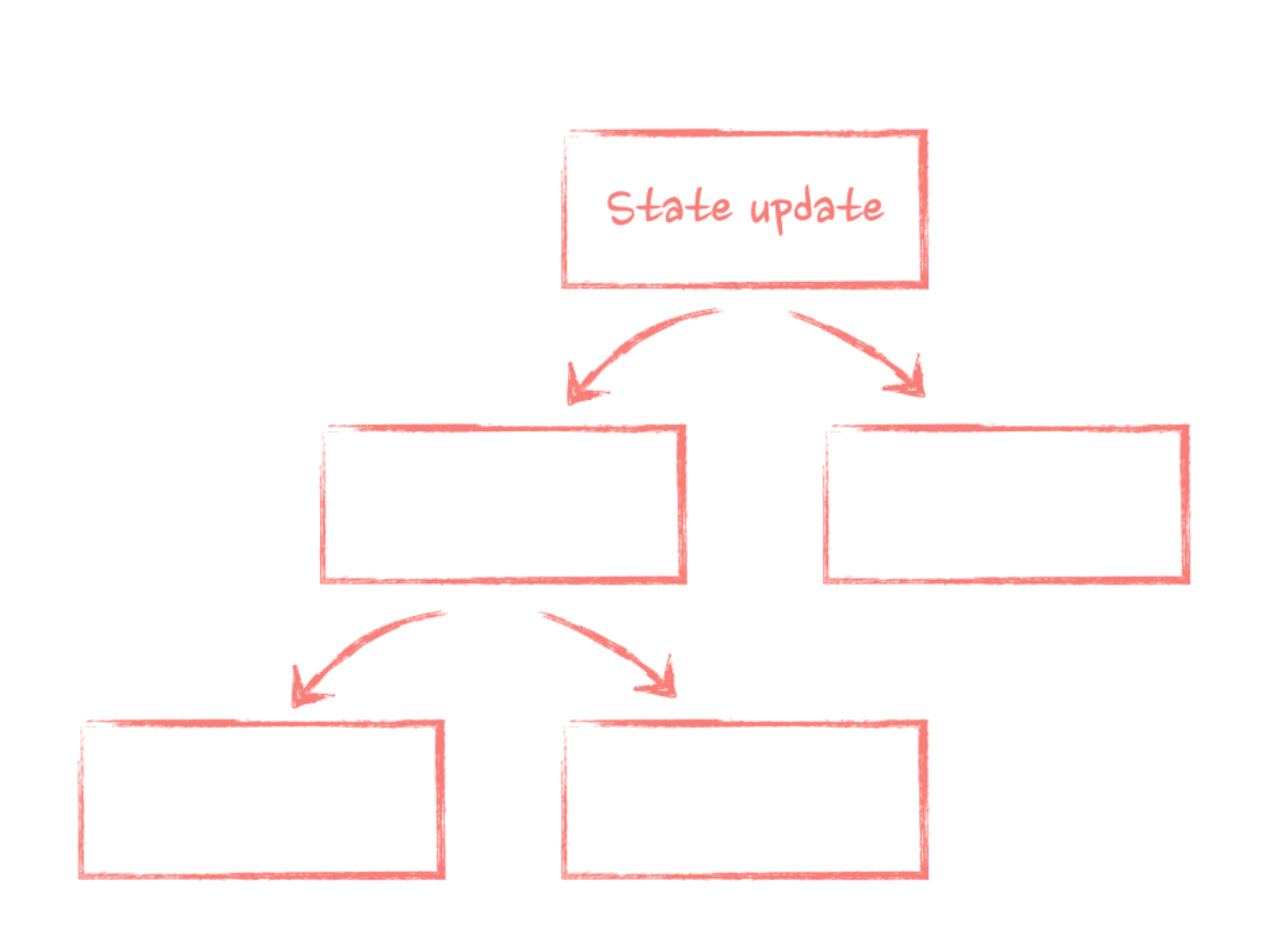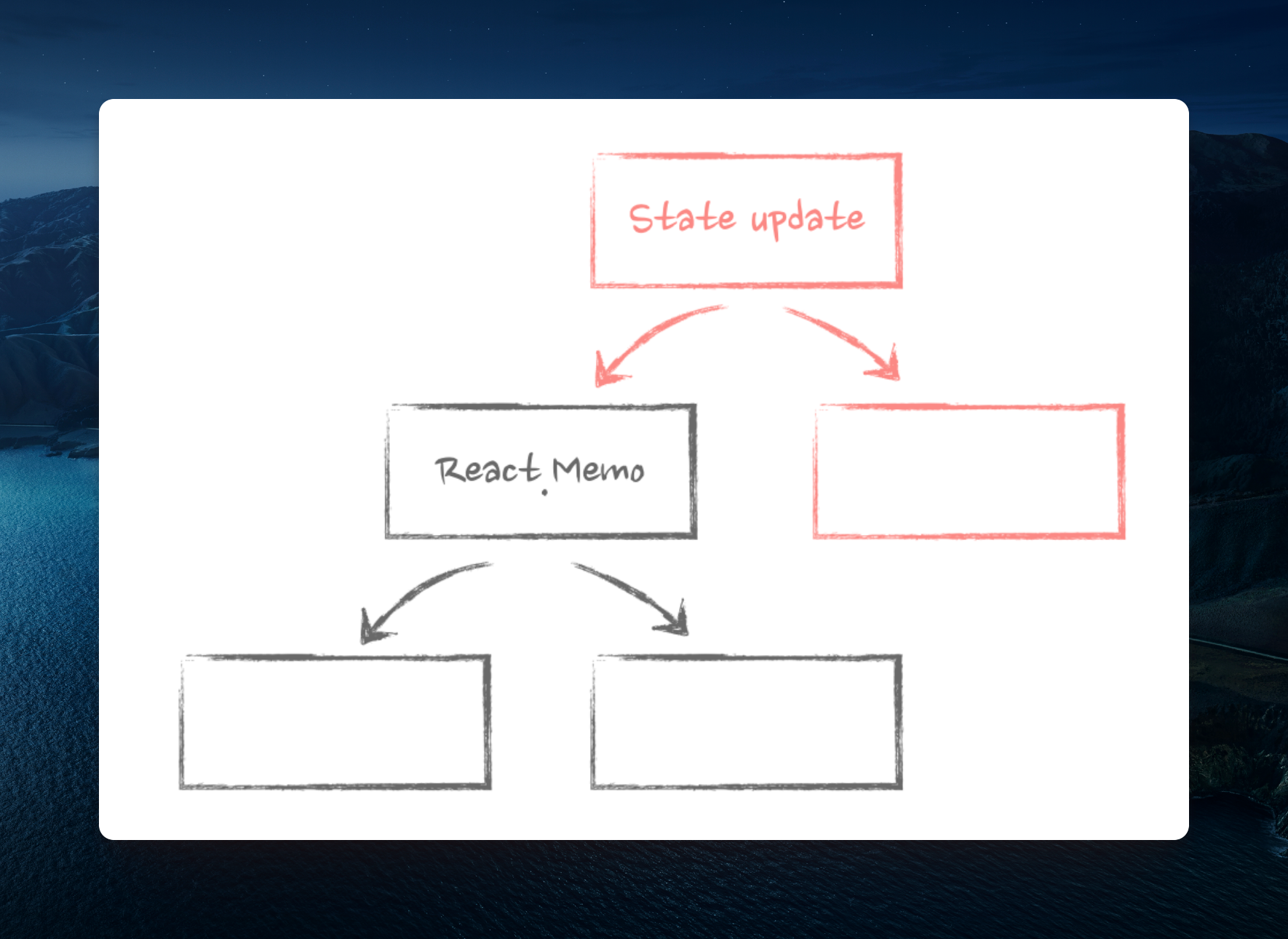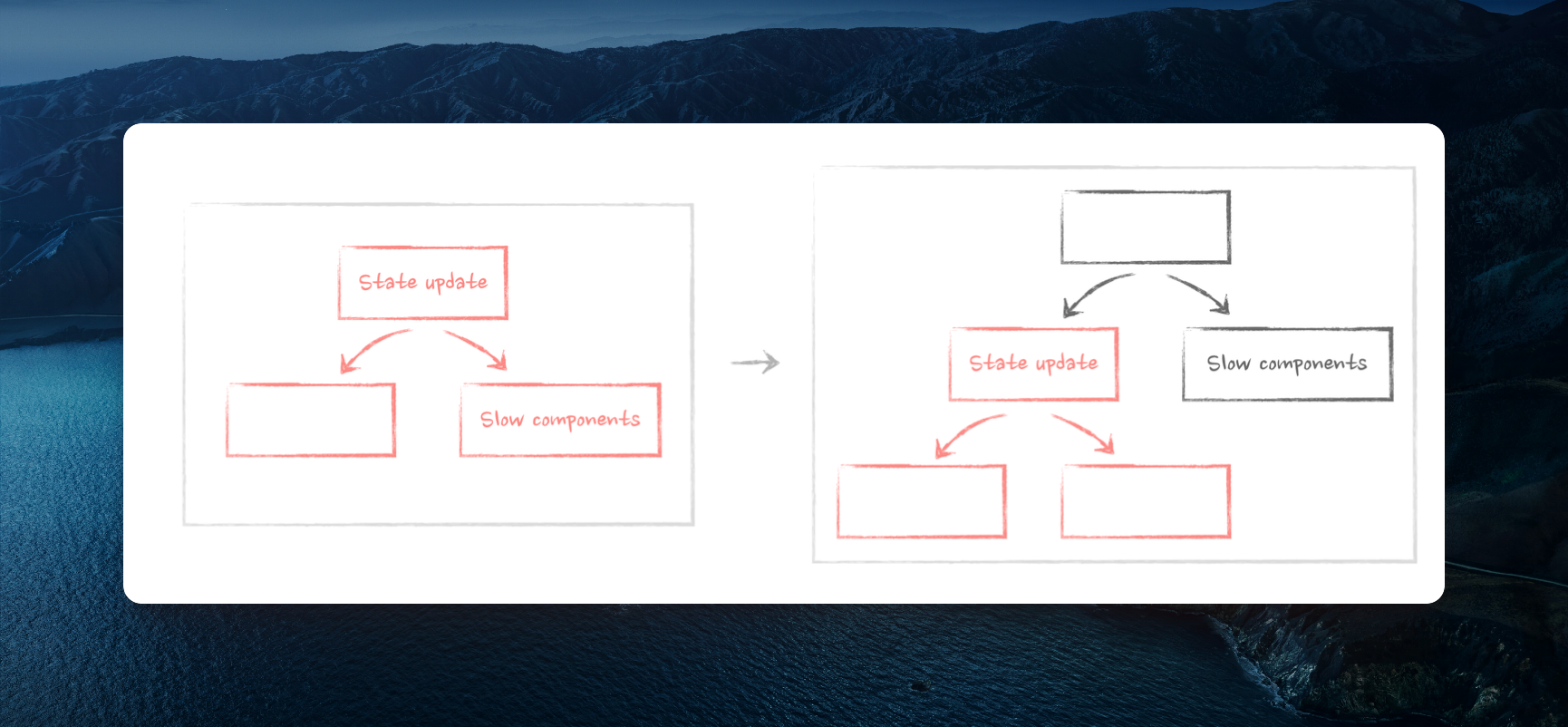作为一个React初学者,在写React程序的时候经常遇到rerender的问题。由于写的都比较简单,也没有关注rerender带来的问题。但是遇到问题了又到处Google找问题,还是比较浪费时间的。所以这次下定决心学习一下React的Rerender的机制。
当Component第一次出现在屏幕上,我们称之为mounting。React会初始化Component的state, 运行hooks,添加element到dom中。
当React检测到Component不再需要时,我们称之为unmounting。React会执行clean-up,销毁组件及其相关的state,最后从dom中移除element。
rerender是在已经存在的Component的基础上,一些state发生了变化,导致Component重新渲染。相比于mounting会更加轻量。
每次rerender都始于state的改变。你可以把React App想象成1棵树。state变化的那个节点会导致这个节点下面的所有分支节点都重新渲染。

你可能听说过props改变了也会导致Component rerender。但这是个误解,出现这个根本原因还是因为state发生了变化。来看下面这个例子
const App = () => {
// local variable won't work
let isOpen = false;
return (
<div className="layout">
{/* nothing will happen */}
<Button onClick={() => (isOpen = true)}>
Open dialog
</Button>
{/* will never show up */}
{isOpen ? (
<ModalDialog onClose={() => (isOpen = false)} />
) : null}
</div>
);
};
当点击Button的时候,isOpen会被改变,但是ModalDialog并没有重新渲染。local variable不会被React追踪,所以ModalDialog不会重新渲染。
再看看下面的代码。isOpen的值发生改变,会导致整个App都会重新渲染。VerySlowComponent、BunchOfStuff、OtherStuffAlsoComplicated这些组件并不依赖isOpen,但是都进行了rerender。
const App = () => {
// our state is declared here
const [isOpen, setIsOpen] = useState(false);
return (
<div className="layout">
{/* state is used here */}
<Button onClick={() => setIsOpen(true)}>
Open dialog
</Button>
{/* state is used here */}
{isOpen ? (
<ModalDialog onClose={() => setIsOpen(false)} />
) : null}
<VerySlowComponent />
<BunchOfStuff />
<OtherStuffAlsoComplicated />
</div>
);
};
一种方式是React.memo进行包装。React.memo会对props进行浅比较,如果props没有改变,就不会重新渲染。

但是这个例子中,并不需要使用memo,有更好的方式就是将state下沉下去。
const ButtonWithModalDialog = () => {
const [isOpen, setIsOpen] = useState(false);
// render only Button and ModalDialog here
return (
<>
<Button onClick={() => setIsOpen(true)}>
Open dialog
</Button>
{isOpen ? (
<ModalDialog onClose={() => setIsOpen(false)} />
) : null}
</>
);
};
const App = () => {
return (
<div className="layout">
{/* here it goes, component with the state inside */}
<ButtonWithModalDialog />
<VerySlowComponent />
<BunchOfStuff />
<OtherStuffAlsoComplicated />
</div>
);
};
现在点击Button的时候,只会重新渲染ButtonWithModalDialog,不会重新渲染其他组件。

自定义hook的注意事项
在上面这个例子中,可以简单的定义一个自定义hook -> useModalDialog
const useModalDialog = () => {
const [isOpen, setIsOpen] = useState(false);
return {
isOpen,
open: () => setIsOpen(true),
close: () => setIsOpen(false),
};
};
const App = () => {
// state is in the hook now
const { isOpen, open, close } = useModalDialog();
return (
<div className="layout">
{/* just use "open" method from the hook */}
<Button onClick={open}>Open dialog</Button>
{/* just use "close" method from the hook */}
{isOpen ? <ModalDialog onClose={close} /> : null}
<VerySlowComponent />
<BunchOfStuff />
<OtherStuffAlsoComplicated />
</div>
);
};
自定义hook隐藏了在App中有state。所以当state发生变化会导致整个App重新渲染。尽管不在App中使用,或者自定义hook没有返回什么,也会导致整个App重新渲染。比如下面这样。
const useModalDialog = () => {
const [width, setWidth] = useState(0);
useEffect(() => {
const listener = () => {
setWidth(window.innerWidth);
}
window.addEventListener('resize', listener);
return () => window.removeEventListener('resize', listener);
}, []);
// return is the same
return ...
}
整个App都会在resize的时候重新渲染。即使这个width没有返回。
Hooks就像裤子上面的口袋,你手举10kg的哑铃,将哑铃放在口袋里面并不能改变你携带10kg重物的事实。你需要将哑铃放置在手推车里面。
即使hook依赖另外一个hook,也会导致整个App重新渲染。
const useResizeDetector = () => {
const [width, setWidth] = useState(0);
useEffect(() => {
const listener = () => {
setWidth(window.innerWidth);
};
window.addEventListener('resize', listener);
return () => window.removeEventListener('resize', listener);
}, []);
return null;
}
const useModalDialog = () => {
// I don't even use it, just call it here
useResizeDetector();
// return is the same
return ...
}
const App = () => {
// this hook uses useResizeDetector underneath that triggers
// state update on resize
// the entire App will re-render on every resize!
const { isOpen, open, close } = useModalDialog();
return // same return
}
为了解决这个问题,还是需要将state下沉下去。
const ButtonWithModalDialog = () => {
const { isOpen, open, close } = useModalDialog();
// render only Button and ModalDialog here
return (
<>
<Button onClick={open}>Open dialog</Button>
{isOpen ? <ModalDialog onClose={close} /> : null}
</>
);
};